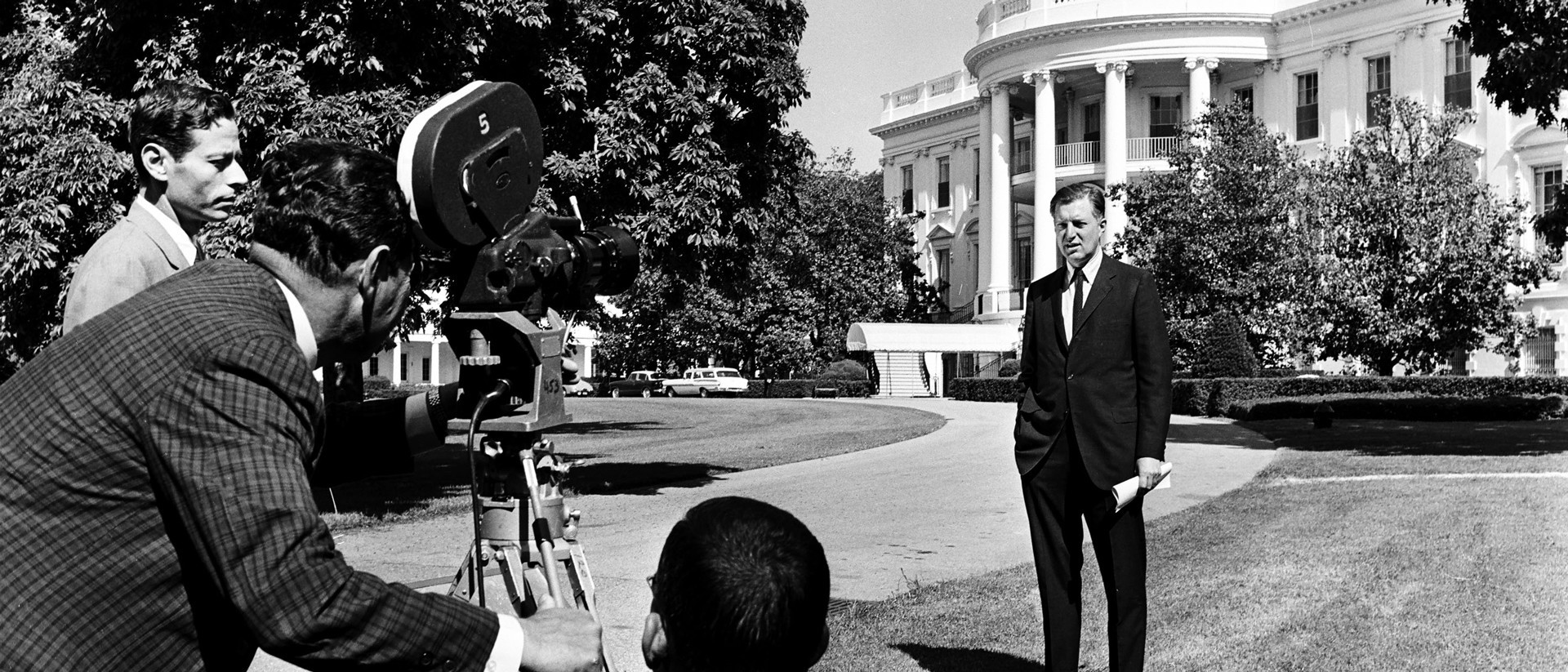Our news system has fundamental weaknesses, and we’re paying the price like never before. In the past, we could afford to watch the nightly headlines, give a slightly cynical shrug, and then get on with our evening.
Today, though, the price of our media-cultivated apathy has grown dangerously high. Our hard-won fundamental rights and freedoms are in peril. If we aren’t careful, the news could be the burial ground for democracy. And the epitaph will be “We could have known, if journalism had only told us.”
In a changing climate, news is a weather report
The most glaring weakness of news is the fact that, exceptions notwithstanding, it’s almost always about events, snapshots in time. This has to do with a criterion referred to as timeliness: news is supposed to be about things that happened recently, at a specific point in time. A news story needs a reason to be reported today, not tomorrow or the day after or next week. Things that are happening every day – global warming, for example – don’t make the front page or the nightly news. Developments that structural, not momentary, have no “news value.” Or, to use another piece of jargon, there’s no “news peg” to hang them on.
Photo by NBC News via Getty Images
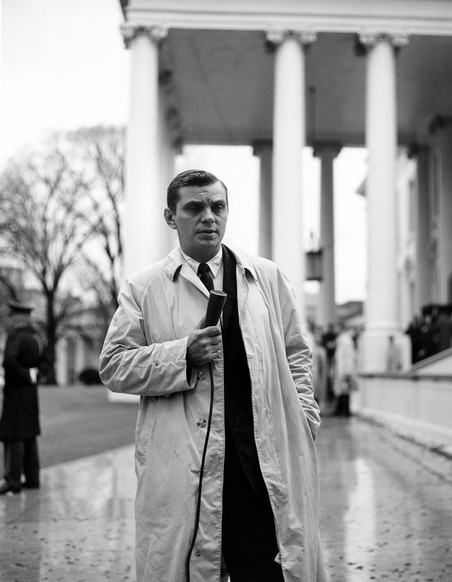
Since news consists mainly of a series of separate, unrelated events, it grossly neglects developments taking place at a deeper level. Climate change is a good example. If there were no scientists, only journalists, this slow, invisible, unsensational problem never would have come to our attention. News is about the weather, not the climate.
As a consequence, major crises almost never show up on the news radar until it’s too late. Weeks of agonized media soul-searching invariably follow: How could we have not seen this coming? In my career as a journalist, I’ve watched three such crises unfold from inside editorial offices, complete with the inevitable question that haunted the news team afterward.
The eternal question: How did we miss this?
The first blaze to break out was the declaration of the failure of Dutch multiculturalism, signaled by the rise of anti-immigration political party leader Pim Fortuyn in 2002. A long-brewing discontent with diversity flared up, seemingly out of nowhere. Politicians in The Hague looked on in shock as the bald professor from Rotterdam shook the foundations of the status quo. Meanwhile, Dutch journalists looked in the mirror despairingly. How did we miss this? What followed was a decade of “saying the unsayable.” Today, the polls here are led by a party calling to abolish five constitutional rights.
Photo by Elina Mara / The Washington Post via Getty Images
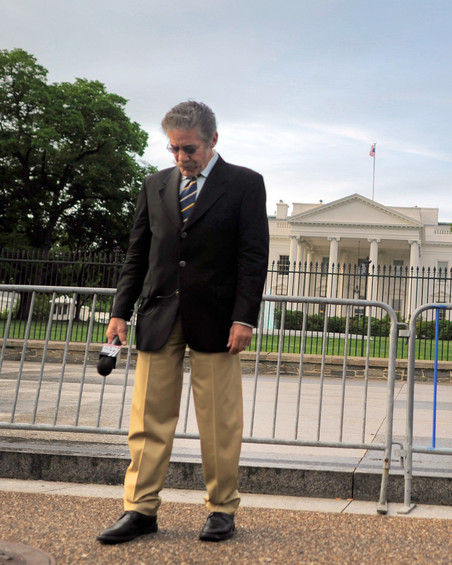
Then came an earthquake whose epicenter lay elsewhere: Wall Street. The fall of Lehman Brothers precipitated the biggest financial crisis in 80 years. An edifice built on bubbles and credit packages, and shot through with impenetrable risks, collapsed like a house of cards. Billions were spent to save the global economy from self-inflicted destruction. And again the halls of media organizations rang with the same anguished question: Why didn’t we see it coming? Today, the big banks that brought the economy to the brink of the abyss are again registering record profits.
And then a storm blew in from rural America, with a man called Donald J. Trump at its eye. Comedians begged him to run for president; serious commentators dismissed him as not having a chance, before he even joined the race. Two hours before the election results were in, the front pages announcing the first female US president were ready to go to press. After all, the polls had been crystal-clear. And again, the same desperate look appeared in journalists’ eyes: How in the world did we get it so wrong?
Photo by Mark Reinstein / Corbis via Getty Images
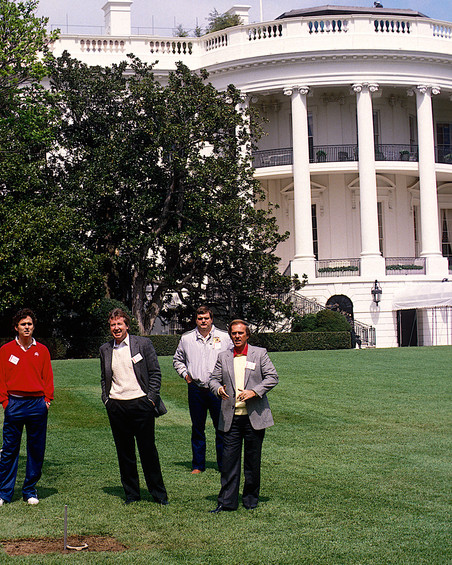
The answer to this question is usually the same. A chorus of voices replies: it’s the ideological bias, stupid! The failure of multiculturalism, the collapse of the financial system, the revolt of the common man – the “liberal media,” the chorus asserts, simply refuse to see it. We turn a blind eye to whatever doesn’t fit our narrow view of the world. We’re scaredy-cats afraid to tell like it is – the Lügenpresse, or “lying press,” in the language of the Nazis and, more recently, of some Trump supporters.
My conclusion, however, is a different one. The media doesn’t notice these slowly unfolding events because journalists are taught at J-school and in the newsroom not to think about things that way. When you’re looking through a 24-hour lens, you don’t have to be a progressive to overlook the consequences of immigration, financialization, and globalization. The lens keeps you from seeing them.
What Pim Fortuyn, Lehman Brothers, and Donald Trump have in common is that they’re the sensational results of unsensationally slow events: increasing ethnic and cultural segregation, a pileup of increasingly complex financial risks, the atrophy of the Western middle class. They’re earthquakes without news pegs. Meanwhile, we fill columns and talk shows with highly visible, yet negligible, threats (like ISIS) ascribed to illusory villains (like Islam). Because terror attacks are ready-made news stories. They’re designed to be.
As the cameras focus on today, we forget the everyday. And as the press dots its I’s, no one connects the dots. And so the defining events of the age take place mostly out of view – until we hear a bang and the catastrophic results appear on our screens.
Hey, look. A dead Dutch populist just won 24 seats in Parliament.
Hey, look. A 159-year-old bank just collapsed.
Hey, look. A kleptocrat just got elected CEO of the free world.
Photo by Paul Richards / AFP
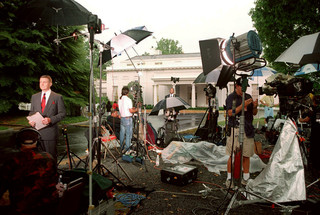
The deadly event that’s happening now
Right now, one of those slow-mo events is under way. It’s appearing in too fragmentary a form on our screens to truly worry many people. But historians will describe it as the steady demolition and ultimate fall of every democratic institution in the West.
The free press. The independent administration of justice. Parliamentary democracy. Constitutions.
In the United States – and coming soon to a Western Europe country near you – the demolition is being carried out with fierce intensity. Anyone who sees this as the hasty or biased conclusion of a leftwing Amsterdam journalist and believes we should “wait and see what Trump will do” is stone-blind to the transformation taking place. The United States is being turned into a kleptocratic autocracy as we speak.
All the signs are right there in front of us. And they reveal a clear two-step plan.
Step 1: Threaten the free press and sow doubt about what’s true
During his campaign, Trump openly kept a blacklist of news organizations and threatened to toughen laws which could muzzle critical media outlets. He hasn’t dialed back the threats since the inauguration.
Photo by: Wally McNamee / Corbis via Getty Images
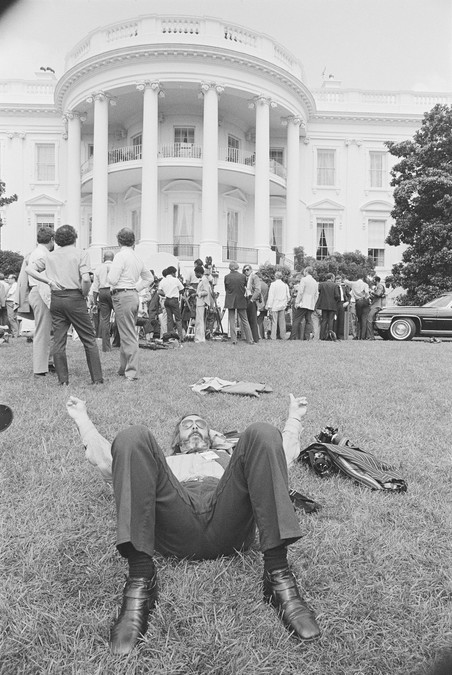
Trump has appointed as a close advisor the billionaire Peter Thiel, a man who sued the online publication Gawker into bankruptcy out of personal vindictiveness. The president lashes out daily at media organizations not favorably disposed toward him, satirical TV shows included. He boycotts critical reporters at his news conferences and threatens to ban members of the press from the White House entirely. In the first week of his regime, six journalists were arrested while reporting on anti-Trump protests.
And the president has appointed Steve Bannon as his chief strategist – the highest advisor in the White House with the most agenda-setting power. Multimillionaire Bannon is a founding board member and the former head of Breitbart News, a far-right website that fabricated and spread wild conspiracy theories daily during his tenure. Bannon has since named his primary target. “The media here is the opposition party,” he said, and it “should … keep its mouth shut.”
This statement deserves to be taken seriously as an outright declaration of war. The First Amendment of the US Constitution, which guarantees freedom of speech, doesn’t shield the press nearly as robustly as people tend to assume, as law professors RonNell Jones and Sonja West point out.
And the press doesn’t even need to be hobbled to become irrelevant. Undermining its credibility will be enough. Trust in the media is already woefully low in the US – and it’s not much better in other Western democracies. Let’s be honest: in large part, the click-hungry, ad-driven, sensationalist, trivia-obsessed media have themselves to blame.
But Donald Trump has used existing mistrust to create a whole new reality. By systematically flip-flopping and demonstrably lying, he confuses the public to the extent that in the face of controversy, people start doubting the truth. Users of this manipulation tactic, known as gaslighting, aim to create uncertainty in individuals or groups by consistently denying accusations, contradicting themselves, and lying until their targets doubt their own sanity.
Do this long enough and many people will eventually lose their bearings entirely regarding who and what to believe. Here’s a good illustration. The Washington Post recently took a group of 1,388 US adults and asked half of them which of two pictures showed Trump’s inauguration: the one with the larger or smaller crowd?
Left: Trump’s inauguration. Right: Obama’s inauguration.
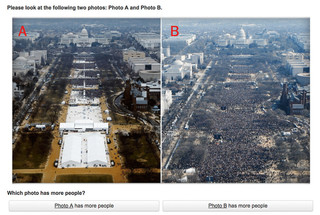
Forty percent of Trump voters answered incorrectly. More significantly, after the second group was told which photo showed which inauguration, 15% of the Trump voters in that group told researchers the photo on the left showed more people than the one on the right. They simply denied their own perceptions in order to maintain the fiction that Trump had drawn a bigger crowd.
This is precisely the effect gaslighting aims at. If you keep repeating “alternative facts” – as Trump advisor Kellyanne Conway called them – long enough, those “facts” start becoming reality. Or, in the words of Friedrich Nietzsche, posthumously embraced as a source of inspiration by Nazi propaganda minister Joseph Goebbels: “Truth is a mobile army of metaphors ... [that] after long use seem solid, canonical, and binding to a nation.”
It’s hard to imagine a more effective strategy for undermining the institution of the free press in the long term. After all, once there’s no longer any shared reality, a media outlet can no longer be defined as truthful. Think of a sports tournament in which everyone believes their own team leads the rankings – play itself becomes impossible. The same is true of the “game” of politics in a democracy.
Step 2: Dismantle the government and install a kleptocracy
A society permeated by mistrust of “the media” and devoid of belief in a shared reality provides the perfect conditions for dismantling democratic institutions. And all the indications are that that’s what Trump is doing.
- As a candidate in the 2012 presidential election, Rick Perry, Trump’s appointee for Energy secretary, promised to abolish the department he will now control.
- Scott Pruitt, Trump’s pick to head the Environmental Protection Agency, is a climate denier who’s suing the very agency he’s being put in charge of, in an effort to reverse environmental regulations.
- Ben Carson, tapped to lead the Department of Housing and Urban Development, called the job HUD was created to do “not the government’s responsibility.”
- Betsy DeVos, Trump’s pick for Education secretary, gave $1.5 million to a lobbying group that favors deregulating education in Michigan and is one of the country’s foremost ideological opponents of public schools.
- Jeff Sessions, Trump’s attorney-general and the person in charge of safeguarding civil rights, allegedly called a white lawyer who represented black clients a “disgrace to [his] race” and said he had no problem with the Ku Klux Klan “until I found out they smoked pot.”
- Steve Bannon, the top advisor in Trump’s cabinet, is a self-described Leninist and open advocate of the destruction of the US state.
Dismantling the government would deliver two overarching advantages for a kleptocratic autocracy – the term for a society in which state power is appropriated for the self-enrichment of an authoritarian leader and his inner circle.
Photo by CBS Photo Archive / Getty Images
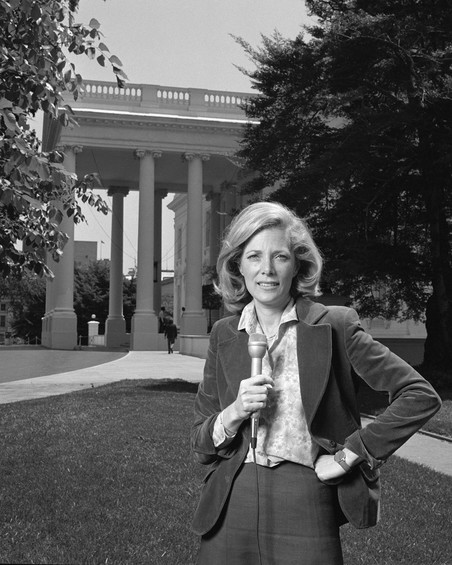
First, the availability of the facts relied on by scientists, journalists, and other professionals working on behalf of the public will further decrease. Government institutions not only carry out policy, they also produce much of the research it’s based on. Shutting them down will clear a path for flooding the public domain with “alternative facts” – a proven formula of autocratic regimes the world over.
Second, dismantling the public sector will grease the way for the transfer of taxpayer property to private individuals. For a model of how to plunder the public purse for private profit, look no further than post-Soviet Russia, the state Trump so admires, where oligarchs made fortunes out of the privatization of former state companies.
There are enough signs pointing to such a scenario in the US that we can no longer call it a conspiracy theory.
Photo by CBS Photo Archive / Getty Images
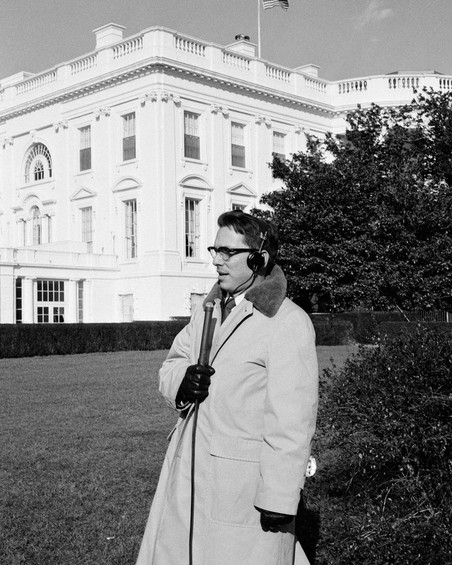
Donald Trump is a real estate magnate, and his two biggest campaign promises revolve around construction projects. He’s pledged to rebuild the national infrastructure and erect a 1,000-mile wall along the Mexican border. The first leaked details of the plans reveal a financing structure based on tax credits that would funnel huge sums to private contractors with scant oversight of how the funds are used. The man charged with guarding against potential conflicts of interest between Trump’s business interests and the US government, George Sorial, is no independent party, but a lawyer employed by Trump’s company since 2007. Trump Hotels’ CEO has already announced a major expansion as a prelude to building 21 more hotels in US cities. Trump’s estate and private club, Mar-a-Lago in Florida, doubled its membership fees to $200,000 the day after its owner was elected president.
Meanwhile, Trump hasn’t sold off his business interests but has transferred them to immediate family members: his sons. In contrast to every president since 1970, he refuses to release his tax returns. During the campaign, he acknowledged avoiding paying taxes to the tune of tens of millions and retorted, "That makes me smart." His sons have tried to raise money for their own nonprofit by promising donors access to their father in exchange for $1 million.
And the cherry on the kleptocratic cake: Steve Mnuchin, Trump’s pick for Treasury secretary – the role would put him in charge of the IRS and give him the authority to loan money on the government’s behalf – set up his own hedge fund and used it to snap up a bailed-out bank for a song during the financial crisis. He then made a tidy profit by forcing tens of thousands of homeowners into bankruptcy. In short, Mnuchin is a man who knows a thing or two about siphoning public funds into his own pocket.
Photo by CBS Photo Archive / Getty Images
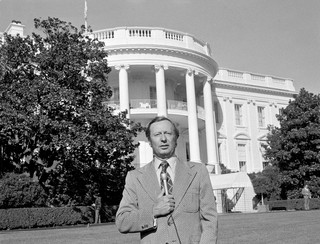
How the news cycle keeps us numb
Every one of these signs of a dawning kleptocracy has been in the news. But almost all of them have appeared in separate reports by different media outlets. So it’s hard to descry the connection between them, and it’s still easy to silence critics who cry “coup” with a bland, “Wait and see.”
After all, any individual report can be qualified or seen as “not that bad.” In a similar vein, the rise of fascism in Germany didn’t seem acute enough to cause widespread alarm until it passed the point of no return.
News produces a serial, short-lived outrage at best – a daily dose of “WTF?!” that quickly ebbs away until the next news cycle rolls around. Anyone who follows what’s going on in Washington will recognize this water-cooler conversation:
- '“Did you hear what Trump just did?”
- “Yep. Unbelievable!”
- “Then again, I heard it wasn’t true.”
- “Really? Wow.”
- “Yeah. Hard to say.”
- “Hmm. Wonder how it’ll end.”
The problem with this kind of outrage is that it never adds up. It just spikes and levels out again. And this repetitiveness is the ideal mechanism for causing fatigue, desensitization, and ultimately apathy. News, then, creates the perfect emotional climate in which fascist, autocratic, and kleptocratic movements can thrive. News is the cradle in which democratic resistance is rocked to sleep.
So it’s no surprise that debate is raging among journalists in the US – and Europe – over how to deal with Trump. Some seek salvation in increased fact-checking; others think the solution is to pay him less attention; still others see activist journalism as the answer.
All those suggestions have their merits, but I don’t think they go far enough. The problem with contemporary news runs far too deep to be solved with more facts, selective attention, or sporadic opposition. Stopping the steady demolition of democracy is going to take more than that.
It’s arguably even more urgent now that Trumplike forces are gaining prominence in Europe. In the Netherlands, one political party consistently leads the polls. The PVV has a single member, its autocratic leader. It keeps its financing a secret. And it seeks to deprive more than 850,000 people in the Netherlands of their freedom of speech, of the press, of education, and of religion, and to take away their right to equal treatment under the law.
Photo by Roger Sandler / NBC NewsWire

Photo by Roger Sandler / NBC NewsWire

Four ways we can make journalism serve democracy
The time has come for the traditional news media to drop some long-cherished dogmas.
First, the business model. As long as news outlets keep depending on ad revenue, they will continue to function as purveyors of human attention, essentially selling their readers to advertisers – and the basic product won’t ever truly change. The benefits of nurturing daily outrage devoid of consequences will be too great to turn down. Only news organizations funded primarily by subscribers can truly change this, because the nature of their product is genuinely different. Subscriber-funded news isn’t an attention-grabber in an eyeball economy but a service in a civil society.
Second, competition. As long as the news media keep seeing each other as opponents in the war for attention, deep-rooted reflexes – like the drive to be first, to keep scoops to yourself, and a general mistrust of cooperation – will endure. But cooperation on more than just an occasional basis is, above all else, what developments of such massive scope and far-reaching consequences call for. The news media – local, regional, national, and global – must combine forces to be capable of piecing together a puzzle this complex. No reporter or editorial team can do it alone.
Third, objectivity. As long as the news media cling to the idea that “staying neutral” and “not taking a position” are the journalistic holy grail, they’ll leave the judgments on current events to the historians. Instead, the media should practice reverse historiography. That is, we should formulate hypotheses for things we see strong but not-yet-definitive indications of, and we should use those hypotheses to attempt to link the puzzle pieces we call news reports into a larger whole. Remember Michael Burry, the guy who predicted the implosion of the US housing market and the 2008 financial crisis? He did it not by watching rates go up and down, but by informed speculation on the housing bubble that was being created. And what’s true of economic bubbles is true of democratic ones: you can only see them pop if you realize they’re there. Fascism never announces itself.
Fourth, formats. As long as news outlets continue to think in terms of traditional genres like spot news, editorials, and features, the information they produce will stay fragmentary instead of adding up to form a bigger picture. We need a way of making news cumulative. Instead of separate reports of individual events, we need to think in terms of a documentation process that will eventually allow patterns to be identified. Only in this way can we truly build a defense against accusations of bias and sensationalism – and only in this way will we stand a chance of seeing apathy morph into sustained resistance.
As an ad-free, member-supported, explicitly subjective news outlet that focuses on structures rather than incidents, De Correspondent is working to build this format. But antidemocratic forces have grown too powerful for a little Dutch media organization to make a difference. We welcome others’ help. Everything is at stake.
Remember the scene in Back To The Future where Marty saves his friend Dr. Emmett Brown’s life, and his tombstone in the photograph vanishes?
It’s not too late to do the same thing for democracy.
—Translated from Dutch by Laura Martz and Erica Moore
Call to readers: Are you a member of the press? And do you have thoughts on how outlets that share these concerns and ideals can join forces? Email me at rob@decorrespondent.nl. I’d love to hear your ideas!
More from De Correspondent:

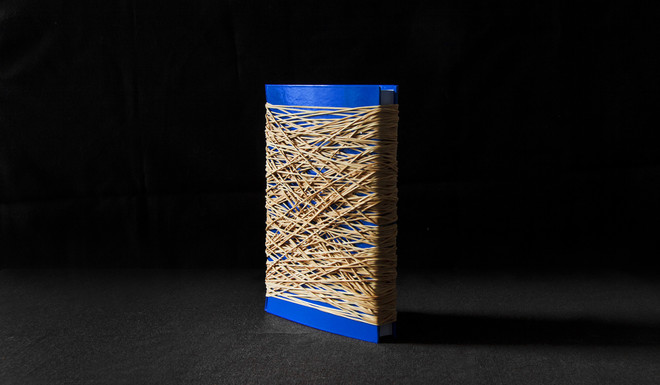 Our kids may never get the chance to know America
This would be a dark chapter in US history even if Donald Trump had lost the election. But thanks to the incoming president, American democracy is in an accelerated state of decay. Is there anything we can do?
Our kids may never get the chance to know America
This would be a dark chapter in US history even if Donald Trump had lost the election. But thanks to the incoming president, American democracy is in an accelerated state of decay. Is there anything we can do?

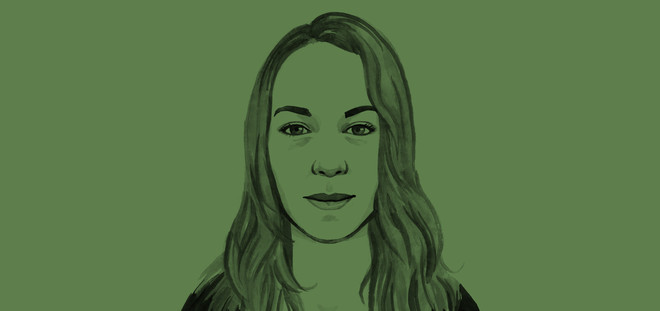 We’re heading into dark times. This is how to be your own light in the Age of Trump
Having studied authoritarian states for over a decade, I would never exaggerate the severity of the threat we now face. But an American kleptocracy is exactly where president-elect Trump and his backers are taking us. That’s why I have a favor to ask you, my fellow Americans.
We’re heading into dark times. This is how to be your own light in the Age of Trump
Having studied authoritarian states for over a decade, I would never exaggerate the severity of the threat we now face. But an American kleptocracy is exactly where president-elect Trump and his backers are taking us. That’s why I have a favor to ask you, my fellow Americans.

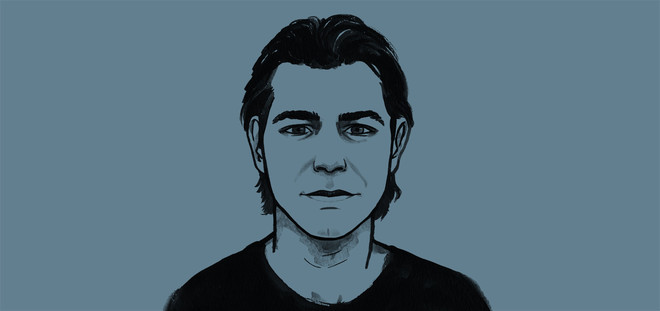 The Trump takeaway: It’s time to pay attention to each other’s realities
Since the election of Donald Trump, there’s been a frenetic search for the culprits. Blame the media! The elites! The polls! We assume, reassuringly but misguidedly, that the new political reality is the fault of everyone but ourselves.
The Trump takeaway: It’s time to pay attention to each other’s realities
Since the election of Donald Trump, there’s been a frenetic search for the culprits. Blame the media! The elites! The polls! We assume, reassuringly but misguidedly, that the new political reality is the fault of everyone but ourselves.



